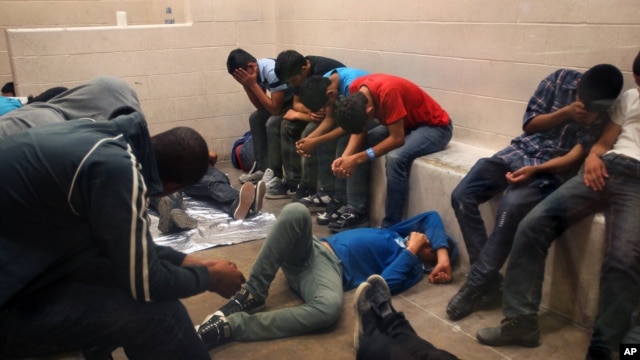US Faces Complex Child Immigration Crisis
Author: Ken Bredemeier
Immigrants, who have been caught crossing the border illegally, are housed inside the McAllen Border Patrol Station in McAllen, Texas where they are processed, July 15, 2014.
Ken Bredemeier
July 16, 2014 10:06 AM
The United States deported 38 children and their mothers to Honduras this week in the first of what it promises will be regular flights sending illegal Central American immigrants back to their homelands.
But the U.S. is finding it difficult to cope with the growing influx of thousands of children, sometimes with their mothers and sometimes alone, who are making the long and dangerous trip from Honduras, Guatemala and El Salvador in search of a better life in the U.S.
About 90,000 unaccompanied children could be apprehended at the border this year, more than triple that of a few years ago.
The immigration crisis along the southwestern U.S. border, chiefly in the state of Texas, is new for the country in its size and origin, with Central American rather than Mexican immigrants looking to move to the U.S.
Complicating the crisis is a 2008 law that gives children entering the country anywhere but from U.S. neighbors Mexico and Canada the right to an immigration court hearing to determine whether they should be granted asylum for humanitarian reasons or sent home.
New phenomenon
Anna Shavers, an immigration law expert at the University of Nebraska, told VOA the country is questioning whether it could accommodate the thousands who are showing up on its doorstep.
"It does sound like a very, very large influx at one time, and the reason it sounds so big, that the United States is different from a lot of countries because we've not had that large numbers that some other countries have had," she said. "You know some countries have millions of people come in every year, claiming to be refugees.... But when we have 50,000, 60,000 people, the question is can we absorb that many people?"
The surge of immigrants is no doubt dwarfed by the hundreds of thousands of refugees fleeing war-torn Syria that its Mideast neighbors are left to contend with.
But U.S. officials, from President Barack Obama to lawmakers, have been scrambling to cope with what he calls a "humanitarian crisis" that his congressional critics say can be blamed on the administration's lax enforcement of immigration laws.
The Republican-controlled House of Representatives has balked at voting on comprehensive immigration reforms approved by the Senate more than a year ago, a measure Obama supports. In the meantime, he is seeking $3.7 billion in funding to deal with the immediate crisis on the border.
Motivation
The U.S. says most of the Central American children are escaping extreme poverty, crime and violence in their homelands, although some of the critics say rumors there have led some to think that if they get to the U.S., they will be allowed to stay. Some of that belief is based on Obama's 2012 order to allow undocumented young people who had been in the country since 2007 to stay if they had been in the armed forces or were pursuing their education.
Nonetheless, U.S. Homeland Secretary Jeh Johnson said the U.S. was committed to returning the recent surge of Central American immigrants to their native countries.
"Our message is clear. If you come to this country illegally into the Rio Grande Valley sector, we intend to send you back consistent with our laws and we are building additional capability to do that quicker and safely,'' said Johnson.
But with a backlog of thousands of immigrants seeking asylum in the U.S. and a shortage of judges to consider the specific circumstances of each case, Shavers said it usually took at least a year-and-a-half, and often longer, before the fate of any individual was decided. Many of the newly arrived simply assimilate into the country and ignore orders to report for court hearings where they could be ordered deported.
One immigration critic, Senator John McCain from the Mexican border state of Arizona, said chances were good that anyone getting into the U.S. would end up staying.
"The latest information we have, that in fiscal year 2013, 20,805 unaccompanied children from El Salvador, Guatemala, and Honduras were apprehended by the border patrol. In that same year, 2013, 1,669 of these unaccompanied children were repatriated to their home countries," he said. "If you were one of these children and you were there in one of these countries, wouldn't you think your odds were pretty good?''
Like Obama, some lawmakers are also calling for more immigration judges. They also want to require them to adjudicate every case within two weeks. Some want to change the 2008 law to permit rapid repatriation of the immigrants, just like undocumented Mexicans who are apprehended are often quickly sent home.
But Shavers saw a peril in such quick justice.
"Right now, they have to have some kind of a hearing," she said. "And if Congress passes a law that says they can be put on a plane and flown right back, I think there are some problems with that, because suppose some of those children really are in danger of their lives. And so they get flown back into the situation that they were in and something happens to them, do you want to be responsible for that?"
As U.S. law stands at the moment, the Central American children setting foot illegally in the country now can be granted asylum if they have "a well-founded fear of persecution" based on race, religion, nationality, political opinion or membership in a particular social group.






0 General Document comments
0 Sentence and Paragraph comments
0 Image and Video comments
General Document Comments 0

